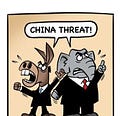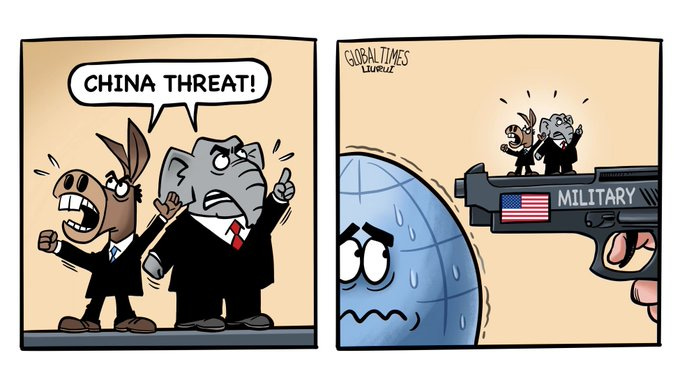US war against Iran to contain China?
The dialectical march of history from colonialism to the equality of nations
Wars and rumors of war
Billy Bob, host of the YouTube program Blowback: Exposing Imperial Decline, sent me his piece making a number of predictions concerning the near future of world dynamics. He predicts, in essence, that the USA will soon launch a war against Iran in order to contain China.
Billy Bob bases his prediction on the assumption that “Western global hegemony perceives itself to be under threat from China’s rapidly growing economic power” plus a second assumption that “the US will implement their plan of containment against China, sooner rather than later, rather than resign itself to an inevitable multipolar world where China becomes too big and too powerful to ever hope to contain.”
Billy Bob maintains that the plan to contain China involves creating a global economic catastrophe and deep economic depression that would weaken China’s commerce with 120 trading partners throughout the world. The specific strategy for provoking the deep depression involves the launching of a military attack against Iran, expecting that Iran would respond by blocking the Strait of Hormuz and disrupting global energy supplies, 20% of which transit the Strait. This retaliatory action by Iran would provide the USA with “the justification for a large-scale attack on Iran, perhaps involving nuclear weapons.”
If Trump wins, Billy Bob maintains, alongside the implementation of the already planned war against Iran, the ruling elite would induce Trump to protect Israel, which would empower Israel “to engage in even more terrorism, ethnic cleansing, and land theft, in order to expand their borders throughout Gaza, the West Bank, Lebanon, Syria, Jordan, and Egypt.” This would be justified before the American people on the grounds that Israel is a U.S. ally in the war with Iran. Billy Bob suggests that perhaps Europe would join in the attack on Iran, including the use of nuclear weapons, to deter Arab countries from becoming involved. Thus, Israel would become a stronger U.S. ally in the region, functioning as a regional superpower, with U.S. and European backing.
Billy Bob thinks that the U.S. will try to neutralize Russia by offering a generous peace settlement with respect to Ukraine and ending Western sanctions, with the condition that Russia orient its economy toward the West and distance itself from China. Should Russia decline, the West would widen the war against Iran to include Russia.
At the same time, the USA would impose a trade embargo and a naval blockade against China. Billy Bob notes that the island archipelagos that surround China’s shipping lanes enable U.S. naval forces, with the backing of Taiwan, to block China’s trade with the world.
As can be seen, the essence of the U.S. plan would be to use military action to block China’s trade with the world, thus compensating for the U.S. incapacity to economically compete with China for trade with the nations of the world. The USA would economically suffer from the consequent disruptions in global commerce, but it would be able to use access to markets and resources in Latin America and the Caribbean to weather more effectively than China the negative consequences for world commerce of the U.S. war against Iran. The nations of Latin America and the Caribbean would be weakened by the disruption of global commerce with China and the Middle East, so the current Latin American and Caribbean drive toward sovereign independence from the USA would be broken, giving the USA greater access to the economies of its neighboring nations to the South.
Billy Bob notes that both Republicans and Democrats have been oriented to the weakening of China through military action that would derail China’s expanding global trade. The Democrats have attempted to use Ukraine to defeat Russia, thus making possible Russia’s fragmentation into smaller vassal states, thereby eliminating one of China’s most important commercial partners. Later, in the Democratic plan, the USA would go after China through Iran. In contrast, the Republicans, with strong support from the Jewish lobby, are more oriented to weakening China through war with Iran and military support for Israel, thus blocking maritime oil routes originating in the Middle East, as a prelude to a trade embargo and naval blockade of China. With the failure of the Western proxy war in Ukraine against Russia, the Democrats are increasingly oriented to containing China through war with Iran and the disruption of oil transportation originating from the Middle East.
In my view, if Billy Bob is right, if the power elite is planning a war against Iran to contain China, I am not sure that Trump, if he wins the election, would go along, especially if he were to win by a solid margin. Trump’s discourse, and more clearly the discourses of Vance and the MAGA-dominated Republican Party Platform, stress containing China through tariffs and protection; and they propose reducing American military presence abroad, so that the armed forces can concentrate more on defense of U.S. territory. In addition, they propose the development of the productive capacity of the American economy, which has been ruined by emphasis on economic globalism and financial speculation by the political establishment. The development of the productive capacity of the national economy would give the United States a stronger capacity to compete with China in the world-economy. The Republican agenda, which has elements of populism, includes a tax structure that stimulates investment by American corporations in the productivity of the American economy, and eliminating those environmental restrictions that are not truly necessary for the protection of the environment.
§
The dialectical march of history from colonialism to the equality of nations
Billy Bob presents an interesting projection of a U.S. war against Iran to contain China. Certainly, Billy Bob’s projection is empirically supported by U.S. support of Israeli aggression, which has now expanded to include attacks on Iran; the proxy war in Ukraine; and U.S. military maneuvers near China.
On the other hand, the American power elite, in my view, has shown that it learned through the Vietnam War the limits of military power. Since that time, the United States has gone beyond surgical strikes and proxy war to full military invasion only with respect to nations where it thought that it had a clear military and ideological advantage. And even wars of this kind have their blowbacks, as Iraq and Afghanistan show. Moreover, Iran would be a formidable opponent; a war against Iran would be a risky undertaking that could backfire on the international and domestic fronts.
In consideration of U.S. appreciation of the limits of military power, the current U.S. military activities in China’s theater and military support for Ukraine and Israel could be interpreted as an unconventional war that is already underway. As described by Cuban scholars, there is a military component of unconventional war, which includes a threatening military presence, surgical strikes, and proxy wars. The military dimension is accompanied by other components that in many cases are more important: economic sanctions, financial restrictions, ideological distortions, and support for opposition movements. The multidimensional unconventional war, launched without announcement during the last two years of the Obama Administration, seeks to promote political instability and economic weakening in nations that reject Western imperialism and are seeking to construct an alternative world order. China is the most important of the anti-imperialist nations, because of the vitality and large size of its economy, combined with Xi Jinping’s clear promotion on the international stage of an alternative world order characterized by win-win cooperation and mutually beneficial trade among nations.
Whether or not the ongoing unconventional war is a prelude to a war against Iran, the current situation of worldwide conflict underscores the importance of consciousness of what is unfolding in the Global South and East. If we understand well what is occurring, we see that China is not seeking to become a dominating power in the world-system, displacing the United States. Rather, China and other leading anti-imperialist nations are trying to create a world-system in which no nation dominates or uses domination for exploitation and economic advantage. The anti-imperialist nations maintain that a world-system of competing imperialisms can no longer contribute to human progress and cannot ensure a sustainable future for humanity. This suggests that the issue of the rise of China ought to be reframed.
Consciousness and solid understanding of the process and worldview of anti-imperialist construction from the Global South and East would enable the American people and the American power elite to see a third possibility, beyond, on the one hand, war against Iran and the disruption of world commerce in order to weaken China, and on the other hand, a degrading deference and submissiveness to Chinese power. The third option involves adaptation to the new type of world-system that is emerging.
Understood in historical and theoretical terms, the emerging world order is the culmination of the modern dialectic that was initiated by Western European domination of the world, beginning in the sixteenth century, and reaching its completion by the beginning of the twentieth century. European colonial domination gave rise to its antithesis, which took the form of anti-colonial resistance by and for the colonized. The anti-colonial movements accepted as necessary significant political, economic, and cultural dimensions of the colonial process, but they proposed to transform the imposed world structures in ways that protected their rights as nations and peoples, including their rights to sovereign equality as nation-states, to modern economic development, and to self-determination. The anti-colonial movements were thus pointing the way to a synthesis of the perspectives of the colonizer and the colonized.
The synthesis of the modern dialectic will be achieved when the Western powers embrace and commit to the demands and just claims of the formerly colonized peoples. The synthesis has been emerging in two stages, the first involving transition to the political independence of the colonized in a neocolonial world-system with essentially colonial economic structures; and the second involving the move toward a post-colonial world order characterized by the true sovereignty of nations and by mutually beneficial trade among nations. China, Russia, Iran, Cuba, Venezuela, Bolivia, and other nations are seeking to lead the world toward the completion of the modern dialectical process.
The United States, either through war with Iran to contain China, or through unconventional war to weaken all anti-imperialist states, or both, is seeking to stop the dialectical march of modern history. The United States can do so only through destruction, which also could lead to its own demise. It would be far more dignified for the American republic to participate positively in the second stage of the modern synthesis, in which cooperation and mutually beneficial trade are established as an international norm. In doing so, the United States would once again be one of the world’s leading nations, and it could interpret its enlightened turn as the fulfillment of the promise of democracy contained in the founding of the American republic.
In the emerging new world order, there are ample possibilities for the defense and promotion of American national economic interests. In spite of its decline relative to the emerging economies, the United States continues to have one of the largest and technologically advanced economies of the world. It could play an important role in fostering win-win economic relations with other nations, and this would be welcomed by the nations of the Global South, which have proclaimed for six decades not only the need for South-South cooperation but also the importance of North-South cooperation, precisely because of the advanced character of the nations of the North, which of course is a legacy of centuries of colonial and neocolonial domination. The modern dialectical synthesis can attain its most perfect completion through the participation of nations of the North that have arrived to an enlightened understanding of the common interests of humanity.
The enlightened turn of the USA toward North-South cooperation could occur in two ways. First, members of the American power elite could arrive to understanding, enabling them to lead the nation toward the development of mutually beneficial relations with China and other nations. This would have very positive consequences for the American people and the nation as a whole. And it would enable the elite to consolidate its control of American political institutions, at least for a good part of the twenty-first century, inasmuch as all would benefit from a world of peace and prosperity.
The other possibility is the continued destructive myopia of the power elite, leading to an awakening of consciousness among the people, taking them beyond rebellion with respect to isolated issues to a non-violent revolution that seeks the taking of control of the institutions of the nation from the power elite through the imperfect electoral process. In this scenario, the delegates of the people would lead the nation on the necessary road of North-South cooperation.
For the people to take political power, they will need good arguments in favor of a dignified alternative to war in response to the emergence of China, an alternative that does not involve surrender. If good arguments are provided, the people are likely to support an alternative to war, because the people do not want war. If good explanations in defense of dignified adaptation to the emerging world order are presented to the people, they can be mobilized to prevent a war against Iran, or if necessary, to use opposition to a pending or launched war as the key proposal in a platform that seeks to take control of the nation’s institutions by the people, taking the levers of power from the hands of the elite.
It might be tempting for those of us who are socialists to hope that the power elite does not awaken and that the people will see their unpreparedness to govern the nation, stimulating a non-violent revolution that takes political power from the hands of the elite. But this would be a politically immature hope. A scenario involving war against emerging nations combined with political conflict at home would have many risks, where many bad things could happen. If, driven by concern with respect to the unfolding of events, the elite takes an enlightened turn toward peace and cooperation, we who are socialists ought to support this initiative, seeking to unify the people in the new direction. The question of the distribution of power within the American republic can be addressed in another historical moment.
On the other hand, if the power elite persists in its myopia and aggression, seeking to block the emergence of a more sustainable world-system, we socialists should view it as an opportunity to forge creative ideological conceptualizations and political strategies that would propel the non-violent taking of power by the people.
Billy Bob invited me and Canadian socialist Chris Black as guests at Episode 120 of Blowback: Exposing Imperial Decline. We discussed a number of issues, including: the reasons for the current economic difficulties in Cuba; the movement of the nations of the Global South and East toward the construction of a new world order based in win-win cooperation and mutually beneficial trade, with China playing an important leading role; and the need for Western intellectuals and leaders to study and learn from the people’s revolutions of the Global South. You can see the conversation at:
Billy Bob, Blowback, Episode 120
A free subscription option is available, with capacity to read, send, and share all posts. A paid subscription ($5 per month or $40 per year) enables you to make comments and to support the costs of the column; paid subscribers also receive a free PDF copy of my book on Cuba and the world-system. Ten percent of income generated through subscriptions to the column is donated to the Cuban Society for Philosophical Investigations.
People’s Democracy in Cuba: A vanguard political-economic system




